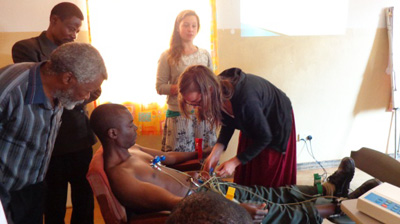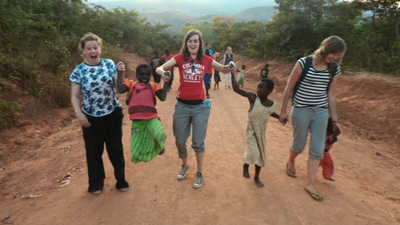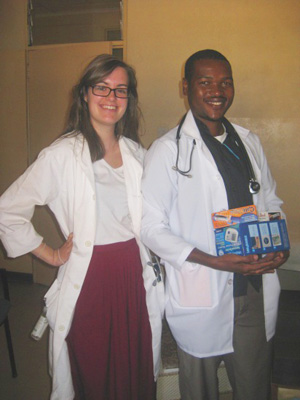Where I went
I went to Ekwendeni mission hospital in Malawi from the 15th of July to the 30th of August. I learnt a lot from the hospital and the patients that presented there. The hospital itself is made up of 5 wards: Male, Female, paediatric, maternity and private and runs well.
Where I was able to help
During our time on elective we realised despite having a working ECG machine, no one used it. Clinical officers (a special post in Malawi, they are trained for 3 years in clinical diagnoses and management) were not trained in it and out of the two doctors, only one could use it however did not feel fully comfortable doing so. This was so surprising to me, as in 4th year I became so accustomed to using the machine, using it several times a day during my medicine shadowing. So whilst we were there, we were able to use the machine to diagnose atrial fibrillation and help with the diagnosis of chest pain. I and my colleague also held a teaching session for the clinical officers in the use of and the interpretation of ECGs. The hope is that they will continue on with the machine's use.

Whilst I was at the hospital, the doctors set up a diabetes and hypertension chronic care clinic. I and my colleague then became heavily involved in its setting up and running. It began on the second Tuesday of our time there and was extremely popular. To help out with this, we helped train the HIV counsellors to become diabetic and hypertension counsellors so that they could counsel the patients that came to the clinic. During the clinic I took the vitals, blood pressure, BMI and their fasting blood sugar for those who had diabetes or symptoms of it. On occasions I would also review those patients who spoke English, deciding on their management. The patients attending the clinic were seriously hypertensive and had very uncontrolled blood pressures. The hope is that by this clinic we will prevent strokes, heart attacks and death.
We were also able to help going out on outreach clinics where we gave immunisations to the children and took blood pressure and measured weight of pregnant mothers. These outreach clinics do amazing work. They go out to really remote villages and without this care, the people would receive no healthcare and infant mortality would be a lot higher. The health conditions out in the villages are really poor. They do a health talk before beginning each clinic and this is usually the only health advice the villagers will receive.
Challenges
There were some very challenging aspects of working within a mission hospital. One aspect was that there some medicines we didn't have enough of. This led to hard decisions, for example who would get the morphine, and so deciding who was in the most pain. An extensively hard decision was when we had two palliative patients and a patient with steven johnsons syndrome (a severe skin blistering condition). However I think this experience makes you a better doctor; you have to become good at making hard decisions and become better at prioritising those sicker patients.
It was also a challenge to know that sometimes we could treat conditions in the UK that we wouldn't be able to treat at the hospital. This was a hard aspect that we just had to accept. What helped me through those challenges was seeing the good performed in the hospital. The nurses and doctors worked really hard and we saw some great recoveries. I saw a lady with Stevens-Johnson syndrome who wanted to die from the pain of her skin peeling off. One day we went to see her and she had new skin forming. She had got her out of her bed and walked for the first time in weeks. Now she is at home and healthy and she praised God for her great recovery. I saw a patient with HIV and a CD4 count of 0, come in with pneumonia and make a brilliant recovery despite the lack of immune system. It was these little miracles which kept me smiling.

Being a missions hospital
Being a mission hospital meant we could recognise that the spiritual well-being of the patients is important as well. We were able to pray with some of the patients and their families. This was really special and it meant we had a special understanding with those patients. It really helped them to know that we were praying for them, knowing not only were we physically and humanly trying to help them but we were calling on a greater power to help them as well. It also helped us to know that they understood that we were only within human limits and it was the power of God that would heal them. There was one palliative care patient who we were able to pray with throughout her stay in hospital. She always wanted to pray, it was a great comfort to her and to us that we were able to do so. She had amazing faith in God and was an inspiration to me.
We were also able to help out with the church's boys brigade during our time there. We taught them new games and played them with them each Sunday after a talk on Christianity.

What I learnt
During my elective I was able to extensively increase my clinical examination skills. The patient's in Malawi presented late in their disease development. Therefore there were numerous clinical signs to interpret. I attended ward round every morning. Afterwards I would shadow the doctors examining and writing up management plans for each patient. In the afternoons I would review the patients and clerk in any new patients. From going abroad to Malawi I was able to learn more about tropical medicine, something we are not taught a lot of in medical school. However with the virtue of travel, it is something that we may see more of in the UK. One common disease encountered whilst in Malawi was tuberculosis (TB). I had never seen someone with tuberculosis before and I saw many cases during my time on elective.
Malawi
The people of Malawi were extremely friendly and the patients were so thankful for you coming to help at their hospital. This is what made the experience so special. We were glad that we choose to go to a developing country so that our presence would be really helpful.






























